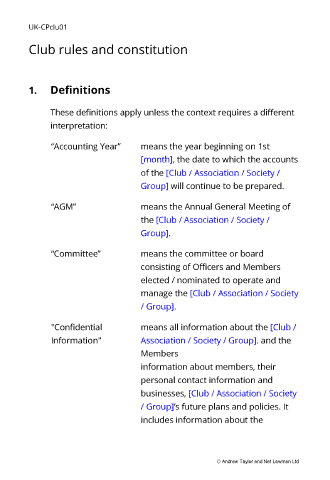Club rules and constitution

Document overview

 England & Wales
England & Wales Scotland
Scotland

- Length:10 pages (1000 words)
- Available in:
 Microsoft Word DOCX
Microsoft Word DOCX Apple Pages
Apple Pages RTF
RTF

If the document isn’t right for your circumstances for any reason, just tell us and we’ll refund you in full immediately.

We avoid legal terminology unless necessary. Plain English makes our documents easy to understand, easy to edit and more likely to be accepted.

You don’t need legal knowledge to use our documents. We explain what to edit and how in the guidance notes included at the end of the document.

Email us with questions about editing your document. Use our Lawyer Assist service if you’d like our legal team to check your document will do as you intend.

Our documents comply with the latest relevant law. Our lawyers regularly review how new law affects each document in our library.
About this club rules and constitution template
Form your own society, association or club using this template. With the included explanatory notes to guide you, you will be able to set out the rules of your association, amongst them:
- the purpose and the goals
- how decisions are made and by whom
- who will control finances
- how members will be admitted and ejected
This template is suitable for a wide range of clubs, including sports clubs, collectors’ clubs, enthusiast clubs (like a bird-watching society), amateur dramatic or music societies, or intellectual pursuits.
It is also suitable for not-for-profit organisations, social enterprises and organisations that may wish to register as charities at a later date.
If you are considering registering as a charity, you may be interested in forming a company limited by guarantee instead.
The law relating to the operation and management of clubs
A club or society is usually formed as an unincorporated association.
Being “unincorporated”, simply means that the organisation is not a company. This has advantages, in that it is easy to set-up and to administer, and disadvantages, in that it has no legal identity of its own beyond the identity of the individual members. The implication of the latter is that the members are personally responsible for any liabilities (debts or obligations) that arise.
The personal liability of members is therefore one of the strongest reasons to have a formal constitution. If you, as a member, are liable for decisions made by another member, you’ll want to make sure that decisions are made in your interest.
Although in law you are not required to have a constitution, in practice, having one safeguard's the interests of members against each other, and provides clear guidelines as to how the club, society or association will work. It is likely to reduce the number of disagreements between members, ensuring the on-going success of the organisation.
When to use this template
It is usual to form a constitution when a club or association is first set up. However, this document can also be used by established associations that either want to expand or formalise their original agreement.
The agreement is suitable for a wide range of organisations. The members may share a common interest (such as learning a language, business networking, or appreciation of wine), a common activity (such as playing a sport) or a common motive (such as a lobbying group). It can be used to form community groups and voluntary groups that might wish to register as charities in the future.
This document contains no provisions for ownership of property and no provisions for an alcohol license. These are possible, and are covered in other Net Lawman constitutions for clubs and associations.
Template features and contents
- Sets out a clear and logical structure by which to manage your organisation, association, club or group
- Variations suitable for many types of club, group or association
- Suitable for organisations wishing to register charitable status
The document includes the following sections:
- Main objective
- Subscriptions, resignation, suspension and expulsion
- Management of the association
- Powers of the committee – what are they and who decides
- Annual general meetings
- Extraordinary General Meetings
- Quorum at meetings
- Voting at meetings
- How and when the rules can and will be amended
- Provisions for dissolution
- Other usual legal paragraphs
- Schedule of annual subscription charges
- Explanatory notes and guidance

Recent reviews
The price was modest too, excellent value.
Highly recommended. This is our "go to" site from now for legal drafts.
Choose the level of support you need
Document Only
This document
Detailed guidance notes explaining how to edit each paragraph
Lawyer Assist
This document
Detailed guidance notes explaining how to edit each paragraph
Unlimited email support - ask our legal team any question related to completing the document
- Review of your edited document by our legal team including:
- reporting on whether your changes comply with the law
- answering your questions about how to word a new clause or achieve an outcome
- checking that your use of defined terms is correct and consistent
- correcting spelling mistakes
- reformatting the document ready to sign
Bespoke
A document drawn just for you to your exact requirements
Personalised service provided by an experienced solicitor
Free discussion before we provide an estimate, for you to ask questions and for us to understand your requirements
Transparent fees - a fixed fee for the basic work, a fixed hourly rate for new or changed instructions, and no charge for office overheads or third party disbursements
Careful and thorough consideration of your circumstances and your consequent likely practical and legal requirements
Provision of options that you may not have considered with availability for discussion
Help and advice woven into the fabric of our service so that you can make the best decisions
All rights reserved
